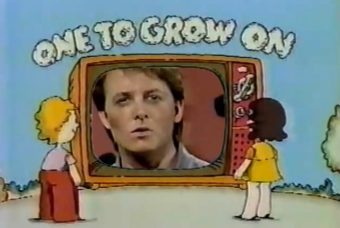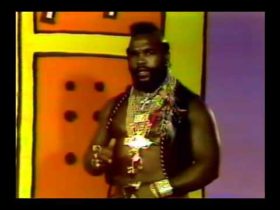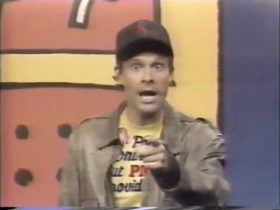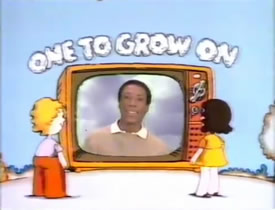 ONE TO GROW ON, a 1980s kiddie PSA show, opens with a cartoon montage so distinctive that, upon viewing the program again for the first time in over thirty years, I found I recalled its every beat (whereas I’d forgotten virtually everything else about the show). Rendered in fluid Bill Plympton-esque animation, the montage begins with a baby that morphs into a kid getting yelled at by his mom, which in turn morphs into another kid transforming into a pig-headed boy after downing a hot fudge Sunday bigger than he. That opening is the most striking thing about the program, which is everything you’d expect: quite patronizing toward its young viewers, cringe-able and plain dumb.
ONE TO GROW ON, a 1980s kiddie PSA show, opens with a cartoon montage so distinctive that, upon viewing the program again for the first time in over thirty years, I found I recalled its every beat (whereas I’d forgotten virtually everything else about the show). Rendered in fluid Bill Plympton-esque animation, the montage begins with a baby that morphs into a kid getting yelled at by his mom, which in turn morphs into another kid transforming into a pig-headed boy after downing a hot fudge Sunday bigger than he. That opening is the most striking thing about the program, which is everything you’d expect: quite patronizing toward its young viewers, cringe-able and plain dumb.
Kid-friendly Public Service Announcements have long been American TV mainstays (as this YouTube compilation shows), and ONE TO GROW ON fits into the PSA tradition quite nicely. It also recalls those heinous ABC Afterschool Specials that aired from 1972-1997, about which Molly Ringwald recently wrote, “All the teens I knew would rather have died than watch one. The films had the whiff of sanctimony, the dialogue was obviously written by adults, the music was corny.”
I myself never bothered watching any of the Afterschool Specials in full, finding that once I’d figured out the moral—which was usually telegraphed around  two minutes into each episode—there was no point in sitting through the remainder of the show. The brilliance of ONE TO GROW ON’s PSA format was that, as each only lasted around 1½ minutes and was nestled among commercials (part of the fun of viewing these things on YouTube was seeing the vintage eighties commercials)—meaning that, unlike the Afterschool Specials, they were very hard to ignore.
two minutes into each episode—there was no point in sitting through the remainder of the show. The brilliance of ONE TO GROW ON’s PSA format was that, as each only lasted around 1½ minutes and was nestled among commercials (part of the fun of viewing these things on YouTube was seeing the vintage eighties commercials)—meaning that, unlike the Afterschool Specials, they were very hard to ignore.
ONE TO GROW ON aired on NBC during its kid show line-ups during the years 1983-89. Each episode featured a prominent actor from an NBC program—THE FACTS OF THE LIFE, KNIGHT RIDER, FAMILY TIES, SILVER SPOONS, THE A-TEAM, RIPTIDE, PUNKY BREWSTER, THE GOLDEN GIRLS, HILL STREET BLUES—fulfilling an apparent contractual obligation. These performers, who invariably sported ultra-trendy eighties fashions and hairstyles, pontificated in front of a cartoon TV set while incredibly goofy music played. The lectures were bookended by short dramatizations featuring bad kid actors (among them Jaleel White, a.k.a. Steve Urkel, playing somebody’s “weird” friend) misbehaving in some way and then, following the lecture, atoning for their brattiness—i.e. in one segment some kids refuse to let another play basketball with them, only to relent and be inclusive in the following portion (a lesson grown-ups in Hollywood would be advised to heed). In short, these programs were everything eighties-era adults thought kids of the time wanted to see.
 Among the lessons imparted are profound utterances like “Smoking is neither a healthy nor cool thing to do,” as said by Kim Fields. Michael J. Fox asks “What’s so hot about playing with matches? Every year thousands of people are hurt or left homeless by the careless use of fire,” while Perry King advises “Instead of beer, cool it with fruit juice or a glass of milk.” Byron Allen claims “There are a lot of ways to have a good time, but destroying someone else’s property just isn’t one of them,” Ricky Schroeder warns “If you lie all the time people won’t pay attention to what you say anymore” (another lesson Hollywood grown-ups would have done well to heed!) and Dwight Schultz reassures us that “When you can’t see it makes you afraid, but when you’re in your own house or your own room there’s nothing to be afraid of” (oh no?). Joel Higgins claims “Pets are not a toy” and a very young Soleil Moon Frye says “Your parents and the doctor only mean for you to feel good, there’s nothing scary about that!”
Among the lessons imparted are profound utterances like “Smoking is neither a healthy nor cool thing to do,” as said by Kim Fields. Michael J. Fox asks “What’s so hot about playing with matches? Every year thousands of people are hurt or left homeless by the careless use of fire,” while Perry King advises “Instead of beer, cool it with fruit juice or a glass of milk.” Byron Allen claims “There are a lot of ways to have a good time, but destroying someone else’s property just isn’t one of them,” Ricky Schroeder warns “If you lie all the time people won’t pay attention to what you say anymore” (another lesson Hollywood grown-ups would have done well to heed!) and Dwight Schultz reassures us that “When you can’t see it makes you afraid, but when you’re in your own house or your own room there’s nothing to be afraid of” (oh no?). Joel Higgins claims “Pets are not a toy” and a very young Soleil Moon Frye says “Your parents and the doctor only mean for you to feel good, there’s nothing scary about that!”
Of the lecturers, the ladies fare much better than the guys, who have a tendency to act cool—and, speaking as an eighties kid who was very much a part of the target audience for the show, I can attest there was nothing the slightest bit cool about ONE TO GROW ON. Beyond that, Dwight Schulze unwisely replicates his “Howling Mad Murdock” shtick from THE A-TEAM, while Jason Bateman looks quite baked in his segment, and I’m guessing Mr. T wrote (or improvised) the spiel in which he modestly proclaims “It took me years of slow, steady training before I became this specimen you see today.” As for the work of the show’s uncredited director(s), it’s about as you might expect—although there are some striking elements here and there, including one segment framed through artfully placed leaves and another visualized entirely from the point of view of a kid’s off-screen mom.
Some of the segments, I must say, are downright questionable. More than one deals with child molestation, a subject requiring a bit more attention, I’d  reckon, than David Hasselhoff advising “If an adult or anyone else has done something to you that you think is not right, you should tell your parents,” or Michael J. Fox’s cogent but overly simplistic adage that “No-one should touch in ways that make you feel uncomfortable.” Another segment focuses on the death of a loved one, a subject dealt with by having Sarah Purcell advise us that “It’s never easy when someone you really care about dies, but you have to go on living.”
reckon, than David Hasselhoff advising “If an adult or anyone else has done something to you that you think is not right, you should tell your parents,” or Michael J. Fox’s cogent but overly simplistic adage that “No-one should touch in ways that make you feel uncomfortable.” Another segment focuses on the death of a loved one, a subject dealt with by having Sarah Purcell advise us that “It’s never easy when someone you really care about dies, but you have to go on living.”
Ultimately I’m left with the question of whether any kid ever altered his or her behavior after watching ONE TO GROW ON. Speaking for myself and my friends, the answer is a pretty decisive no. Again, though, that opening animation is pretty damn cool.
